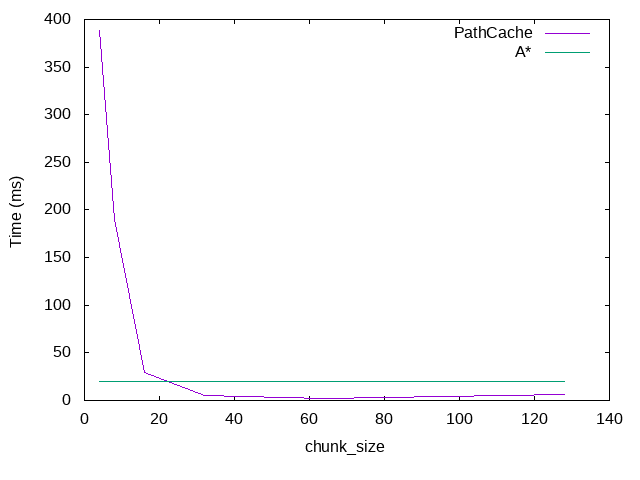Struct hierarchical_pathfinding::prelude::PathCacheConfig [−][src]
pub struct PathCacheConfig {
pub chunk_size: usize,
pub cache_paths: bool,
pub a_star_fallback: bool,
pub perfect_paths: bool,
}Expand description
Options for configuring the PathCache
Default options:
assert_eq!( PathCacheConfig { chunk_size: 8, cache_paths: true, a_star_fallback: true, perfect_paths: false, }, Default::default() );
Performance
For testing, a set of different Grids were used:
- “empty” is simply an Grid where all costs are
1. - “snake” has a single long winding corridor
- “random” is completely random costs and walls
Each Grid was tested as 16x16, 128x128 and 1024x1024. The 16x16 Grid, however, produced only durations less than 100 μs, which are too inaccurate to be measured.
The full List can be seen on GitHub
in the output_*.txt files.
| Grid | 128x128 | 1024x1024 |
|---|---|---|
| empty |  |  |
| snake |  |  |
| random |  |  |
Conclusions:
- Bigger Chunks are usually better
- Chunks that take up the entire Grid are useless (see 128x128)
Memory
for 1024x1024: 100MB - 1000MB, depending on Node density on the Grid.
Can be drastically reduced by setting cache_paths to false, at the expense of repeated
calculations when using a Path.
Fields
chunk_size: usizeThe size of the individual Chunks (defaults to 8)
tl;dr: Depends highly on the size of your Grid and Lengths of your Paths; requires Experimentation if you care.
Rough guide: Scale with a bigger Grid and longer desired Paths. (don’t quote me on this)
This has many different effects on the Performance and Memory:
smaller chunks make calculations within a Chunk faster
- => decreased update time in tiles_changed
- => decreased time to find start and end Nodes
bigger chunks lead to fewer Chunks and Nodes
- => decreased time of actual search (especially for unreachable goals)
- => longer Paths can be found a lot faster
| Use Case | Recommendation |
|---|---|
| Frequent Updates | Smaller Chunks |
| Longer Paths required | Larger Chunks |
| Larger Grid | Larger Chunks |
| “No Path found” is common | Larger Chunks |
| Grid consists of small, windy corridors | Smaller Chunks |
cache_paths: booltrue (default): store the Paths inside each Chunk.
false: only store the Cost of the Path.
This will not affect the calculations or the time it takes to calculate the initial Path.
It only makes a difference when iterating over the returned Path, because that requires
re-calculating the next segment (see safe_next on AbstractPath).
Drastically reduces Memory usage.
a_star_fallback: booltrue (default): When a Path is short (roughly Length < 2 * chunk_size), a regular
A* search is performed on the Grid after HPA* calculated a Path to confirm the
existence and length.
false: The Paths are left as they are.
Setting this option to false will improve performance a bit, but the Paths will take seemingly random detours that makes them longer than they should be.
perfect_paths: booltrue: Nodes are placed on every open entrance of a Chunk. This means that the resulting
Paths are always the most optimal ones, but both Memory Usage and Performance are worse.
false (default): Nodes are placed on only some chunk entrances.
The exact effect depends greatly on the Grid and how the Chunks and their entrances align. It is questionable weather or not you should use Hierarchical Pathfinding if you enable this…
Implementations
Creates a new PathCacheConfig with the given chunk_size.
let chunk_size = 123; assert_eq!( PathCacheConfig::with_chunk_size(chunk_size), PathCacheConfig { chunk_size, ..Default::default() } );
an example PathCacheConfig with options set to reduce Memory Usage
Values:
assert_eq!( PathCacheConfig { chunk_size: 64, cache_paths: false, a_star_fallback: true, perfect_paths: false, }, PathCacheConfig::LOW_MEM );
an example PathCacheConfig with options set to improve Performance
Values:
assert_eq!( PathCacheConfig { chunk_size: 16, cache_paths: true, a_star_fallback: false, perfect_paths: false, }, PathCacheConfig::HIGH_PERFORMANCE );
Trait Implementations
Returns the “default value” for a type. Read more
This method tests for self and other values to be equal, and is used
by ==. Read more
This method tests for !=.
Auto Trait Implementations
impl RefUnwindSafe for PathCacheConfig
impl Send for PathCacheConfig
impl Sync for PathCacheConfig
impl Unpin for PathCacheConfig
impl UnwindSafe for PathCacheConfig
Blanket Implementations
Mutably borrows from an owned value. Read more